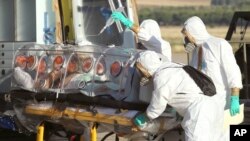Africa is a public health emergency of international concern. A WHO committee of experts is calling for a coordinated international response to stop this deadly disease at its source and prevent it from spreading to other countries.
After sifting through a mountain of information and evidence over the past two days, the WHO emergency committee unanimously declared that the Ebola outbreak in West Africa constitutes an "extraordinary event," which demands extraordinary measures to bring it under control.
The Director-General of the World Health Organization, Margaret Chan, says recommendations issued by the committee aim to contain existing outbreaks in Guinea, Sierra Leone, and Liberia and to prevent further international spread.
"The declaration of a public health emergency of international concern alerts the world to the need for high vigilance for possible cases of Ebola virus disease, but by no means implies that all countries or even many countries will see Ebola cases. Only a small part of the African continent is currently affected," she said.
The Ebola outbreak in West Africa is the largest and worst in history. Latest WHO figures put the number of cases at more than 1,700, including 932 deaths. The disease has spread to Nigeria, where two people have died, and possibly to Saudi Arabia, where one person suspected of having the disease has died. Two U.S. aid workers infected in Liberia are being treated in the United States.
WHO notes it is particularly difficult to bring the disease under control because the three heavily infected West African countries are all emerging from civil conflicts that have left them with weak, fragile health systems.
WHO Assistant Director-General, Keiji Fukuda, says it is important to stop the chain of transmission and this depends on identifying everyone that has the Ebola infection, tracing people with whom they have come in contact and making sure those who are ill receive the right treatment.
He says the committee recommends that countries where the disease is spreading declare a national emergency.
He says the movement of people should be stopped in the so-called hot spot for the disease -- the cross-border area of Sierra Leone, Guinea, and Liberia.
But, he adds, these people must be given quality care, and measures such as quarantine should be used only when considered necessary.
Regarding other countries, Dr. Fukuda says the emergency committee does not recommend a general ban on travel or trade.
"... But it does have the proviso that if you are infected or if you are a contact, these people should not travel… The countries should make sure-these are countries that do not have cases-should have good surveillance that can pick up suspect Ebola cases," said Dr. Fukuda. "We know in a globalized world, that people can travel anywhere, so all countries should be prepared to identify potential cases. And, they should also make sure that they have access to proper laboratory, diagnostic laboratory testing."
The committee recommends the screening of all people at international airports, seaports and major land crossings for unexplained fevers consistent with Ebola infection.
It says countries infected with the virus should not hold mass gatherings, such as football matches, until the disease is under control.
The Ebola virus is spread through the direct contact with infected blood and bodily fluids. Many people become infected when they touch the bodies of dead loved ones during burial ceremonials. It is for this reason the committee recommends well-trained personnel conduct funerals and burials.









